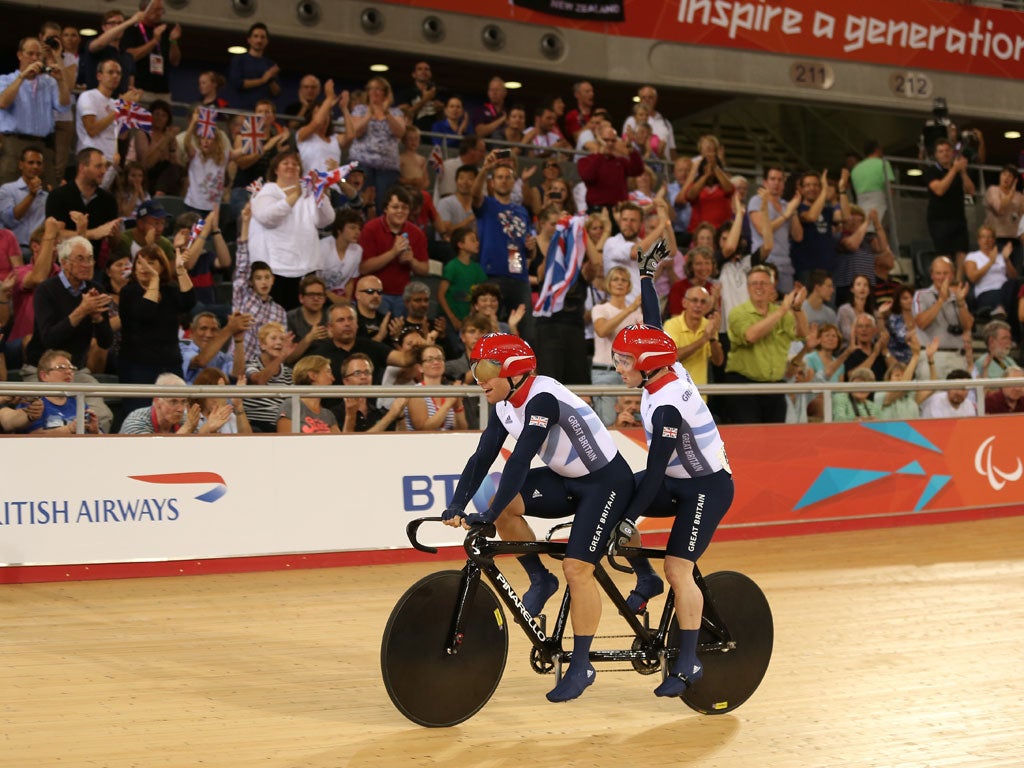Anthony Kappes caps off happy and glorious reign in Velodrome

Your support helps us to tell the story
From reproductive rights to climate change to Big Tech, The Independent is on the ground when the story is developing. Whether it's investigating the financials of Elon Musk's pro-Trump PAC or producing our latest documentary, 'The A Word', which shines a light on the American women fighting for reproductive rights, we know how important it is to parse out the facts from the messaging.
At such a critical moment in US history, we need reporters on the ground. Your donation allows us to keep sending journalists to speak to both sides of the story.
The Independent is trusted by Americans across the entire political spectrum. And unlike many other quality news outlets, we choose not to lock Americans out of our reporting and analysis with paywalls. We believe quality journalism should be available to everyone, paid for by those who can afford it.
Your support makes all the difference.There has been a simple rule of thumb exercised by the crowds shoe-horned into the Velodrome over the course of its short but eventful sporting life. Cheer loudly for anything that moves and if it's British – easy to tell because by and large they move quicker than most – cheer even louder.
After 10 days of competition spanning the Olympic and Paralympic competition, the Velodrome shut its doors last night having hosted another raucous day's racing that featured more of what has become its core ingredient, British success. They will remain shut until next year – when the Velodrome hosts a round of the World Cup – as the surrounding area is redeveloped into a velo-park.
If it seems unfortunate that the success of Britain's cyclists cannot be immediately capitalised upon, cycling's legacy out of the two Games is in no doubt. This is a British success story and one that is not yet into the concluding chapters.
The last feet to step on to the mauve podium in the middle of the arena were clad in the red trainers of Britain's coaches and support staff. As in the Olympics, they are a central part of the story and some, such as psychologist Steve Peters, overlap. "There is no secret formula," said Gareth Sheppard, Britain's Paralympic performance director. "They [the riders] have knuckled down and have the best coaches and best support."
It was a month ago yesterday that Philip Hindes, Chris Hoy and Jason Kenny earned Britain's first gold medal here. The Union flag has been raised another 23 times and the National Anthem played for 12 gold medals. It was the first anthem played and yesterday evening it was the last.
The last to hear it were Anthony Kappes, a partially-sighted chess enthusiast from Stockport, and his tandem pilot Craig Maclean, once a team-mate of Hoy. One step below them were Neil Fachie and Barney Storey, who were beaten 2-0 in the gold medal race for individual B sprint. The last event saw British silver from the team sprint trio of Jon-Allan Butterworth, Rik Waddon and Darren Kenny. Gold went to China, the difference 0.065sec.
"This is becoming more and more like able-bodied sport," suggested Sheppard in holding up the ever- declining margins of victory. We are into the marginal gain territory so beloved of Dave Brailsford.
For Kappes and Maclean there was the relief of taking gold after two false starts on Saturday had cost them the chance of victory in the B kilo. They had watched instead as Storey and Fachie received the acclaim. "It felt like the cat had died," said Kappes.
By yesterday they were over the cat and dominated both final races. The tandem sprint is gripping, an event that has been run in able-bodied meets and would be a happy return to the programme. The two teams, friends and training partners – Storey and Maclean swapped places less than a year ago – prowl slowly along the steep banks for three of the six laps, a game of cat and mouse until one makes its move. It was Kappes and Maclean who made the significant ones.
Maclean rode with Hoy and Jason Queally in the team sprint in Sydney where they won silver. He competed again in Athens but suffered a back injury in 2007 that was to force retirement. A rider has to be out of the sport for three years before he can become a pilot. Maclean joined the Paralympic programme in 2010 and a year later was a world champion with Fachie before swapping rides with Storey.
There was also a second bronze for Aileen McGlynn, who was partnered by Helen Scott in the tandem sprint.
Roll of honour: GB weekend medals
Gold (7)
Rowing: Mixed coxed four LTAMin4+
Athletics: F42 discus: Aled Davies
T54 5,000m: David Weir
Cycling: Men's individual B sprint: Anthony Kappes and Craig MacLean (pilot)
Swimming: Women's 200m freestyle S14: Jessica-Jane Applegate (below)
Equestrian: Individual dressage 1A: Sophie Christiansen
Equestrian: Dressage team event
Silver (8)
Equestrian: Women's Grade 4 individual dressage test: Sophie Wells
Athletics: Women's F42/44 long jump: Stef Reid
Cycling: Men's individual B spring: Neil Fachie and Barney Storey (pilot)
Cycling: Mixed team sprint C1-5: Darren Kenny, Rik Wadden and Jon-Allen Butterworth
Equestrian: Individual grade 3 dressage test: Deborah Criddle
Table tennis: Men's Class 7 singles: Will Bayley
Athletics: Men's 100m T36: Graeme Ballard
Athletics: Women's 100m T12: Libby Clegg
Bronze (3)
Cycling: Women's individual B pursuit: Aileen McGlynn and Helen Scott (pilot)
Swimming: Women's 100m butterfly S12: Hannah Russell
Swimming: Men's 100m butterfly S12: James Clegg
Join our commenting forum
Join thought-provoking conversations, follow other Independent readers and see their replies
Comments